TerraPower on June 11 broke ground on its Natrium reactor demonstration project in Wyoming, making it the first advanced reactor to enter construction.
TerraPower was founded by billionaire Bill Gates and the project is supported by a long-term contract with PacifiCorp, which is part of fellow billionaire Warren Buffett’s Berkshire Hathaway business empire.
“I’m proud of all the partners and people who helped get the most advanced nuclear project in the world built in Kemmerer, Wyo.,” Gates said in a statement. “I believe that TerraPower’s next-generation nuclear energy will power the future of our nation — and the world.”
Construction is expected to take five years and at its peak will employ 1,600 workers. Once the plant is operational, TerraPower expects it will support 250 permanent employees.
The Natrium reactor will be a fully functioning commercial power plant, which is being built at the site of a retiring coal-fired power plant in Kemmerer.
The 345-MW reactor uses sodium-cooling technology with a molten salt-based energy storage system that can boost its overall output to 500 MW when needed, which is enough to power 400,000 homes. The energy storage capability allows the project to help balance with renewable power, which has long been an issue with conventional nuclear plants that that lack ramping flexibility.
The company’s construction permit application is still pending at the Nuclear Regulatory Commission, but it was able to start construction on non-nuclear facilities while nuclear construction awaits regulatory approval.
The NRC announced last week that it was advancing its consideration of the project and noted that if it approves construction, TerraPower would have to submit another application to actually operate the power plant.
“This is a challenging yet exciting time in the energy industry,” PacifiCorp CEO Cindy Crane said in a statement. “In an era of rapid change, the need for reliable, affordable and dispatchable energy will remain a constant. Innovative technologies like the Natrium project will enhance our ability to serve our customers, meet growing demand and ensure a reliable and resilient energy future.”
Engineering firm Bechtel is building the facility, and company President Craig Albert said in a statement that the project will launch a new approach to nuclear construction that is meant to be safer, cleaner and faster. The company has built 150 nuclear plants around the world over the past 70 years.
“Working together, the combination of advanced technology and streamlined constructability has the potential to diversify the U.S. power generation industry,” Albert said. “The option of deploying smaller advanced nuclear plants that can work in concert with other clean energy sources will help speed our progress toward net-zero emissions.”
Constellation’s Dominguez Comments on State of the Industry
Speaking on a Reuters webinar June 10, Joseph Dominguez, CEO of Constellation Energy, which owns and operates one of the largest nuclear fleets in the country, said it’s still an open question which technology will dominate the future of the industry. Dominguez said the existing fleet of reactors could run until 2060 or beyond, but that would require major investments and Constellation is also focused on expanding nuclear production.
“We are expanding the output of our plants,” Dominguez said. “As we change over equipment, we tend to get better materials, better efficiencies and all sorts of things, generators, pumps, everything that allows us to increase the output of the machines and put on the grid almost immediately, at least in power terms — over a handful of years, new firm, clean energy. And then we’re also investigating the next generation of small modular reactors or large-scale nuclear plants.”
Some firm clean power is going to be necessary to reach net-zero goals, and nuclear faces competition from other technologies, including natural gas-fired generation with carbon capture and storage, which Constellation is also looking into, he added.
While the company recently bought NRG’s share of the South Texas Project, Dominguez said other opportunities to buy existing nuclear plants are not on the table because their owners recognize the value of those assets, focusing Constellation on organic growth through capacity uprates, the possibility of restarting its Three Mile Island plant in Pennsylvania, and eventually the potential for building new plants.
“Over the last 10 years, [the industry] only brought on two nuclear units,” Dominguez said, referring to Southern Co.’s Plant Vogtle expansion. “And some reports indicate that those have been as much as $20 billion apiece to build. So, the ability to restart a unit at a fraction of those costs, to create an environment where you can do all the state-of-the-art upgrades to the unit to allow it to be able to run for decades more — that’s an incredibly valuable opportunity for America.”
The theory with small modular reactors is that much of the equipment would be manufactured at a central facility and then transported to the power plant’s location, which is how the industry builds gas-fired and renewable power plants, Dominguez said.
“The way we think about it right now is we’ve got to see these technologies evolve, we’ve got to see folks prove out the competency,” he added. “I think they’ll do that in the next five or six years. And then we’ll select the technologies that best suit our needs, and our customers’ needs.”




